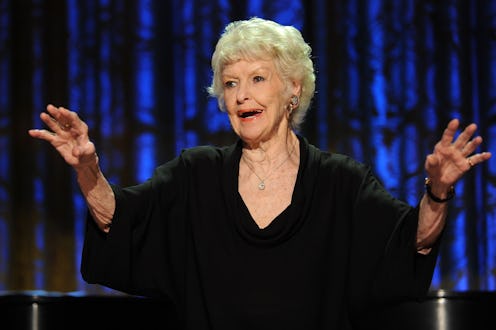Entertainment
Elaine Stritch Stares Down Death in 'Shoot Me'
Being a recent post-grad in the midst of a what you could call a quarter-life crisis, I often spend nights alone on my couch, watching movies in the cold blue light of my laptop screen. One night last week, I came upon the documentary Elaine Stritch: Shoot Me. Anyone who knows me can attest that Stritch is one of a few personal heroes of mine, so the movie immediately went into the queue.
So its strange, now, to hear that she has passed. I'm not a person who gets emotional after celebrity deaths — it's a concept that seems completely foreign to me. After all, what do I really know about them? But watching Elaine Stritch: Shoot Me, you get a real sense of the woman in her last few years of life. She was pushy, but she was a woman who lived life to its proverbial fullest, who stared down death and decided not to be intimidated by its imminent presence.
Shoot Me won't exactly be remembered as one of the best documentaries of all time. It's a little meandering, and would actually be more well served if it followed Stritch more, rather than show old clips and talking heads. But its a well-colored portrait of the woman in her last moments.
Anyone who's ever seen Stritch perform on screen or onstage can attest to what a fearless, foul-mouthed and brassy woman she was. But the film also shows her similarities to her character in 30 Rock: she was lovable but extremely demanding, especially on those who loved her back. And deep down, she was still a devout and conservative Catholic.
Above all else, the woman was completely relentless. She did shows shortly after being hospitalized. On stage, the then-87-year-old was not afraid to poke fun at how she now often forgets her lines. She was frank about her struggles with diabetes and alcoholism. It's clear that this was a woman who found her passion and never let go.
But the film is at its most harrowing when Stritch is forced to stop and face the grim reality: she is going to die soon. After a 7-day hospital visit, Stritch sits in a hospital bed in curlers and a hospital gown. On the verge of tears and clasping her hands together, as if in prayer, she admits, "It's time for me. I can feel it, everywhere. Not all bad... a lot of it is, uh, pleasant. But it's so... to picture, well... even to imagine, in, in any way... nothing. I don't want that. God, I hope that doesn't happen." It's the one moment in the movie when you see Stritch truly shaken, frightened at the prospect of an afterlife full of nothing.
And its almost if she's not only frightened because of her religious beliefs, but because Stritch cannot live in a world of silence, of nothing. She was a woman who truly sucked the marrow out of life. She loved until she couldn't love any more. She worked until she practically fell over. And she was completely unapologetic about all of it. At the end of her life, Stritch accepted that death was her fate, but that didn't stop her from living every moment she could. Eventually, Stritch seems to make a sort of peace with her eventual end and realizes how she wants to live it, and gives a speech most appropriate to this moment:
"Every once in a while, I get this 'swoop-over' thing about this being the end of my life. Kind of a 'My god, it's almost post time to leave the building!' And you think 'Oh...[sings] this is the beginning of the end, I can feel it in my bones.' It's just...getting late! It's...nothing sad! Nothing negative! Nothing "Oh..."! No! It's getting there! And I just pray that I can be...at least amusing about it."
